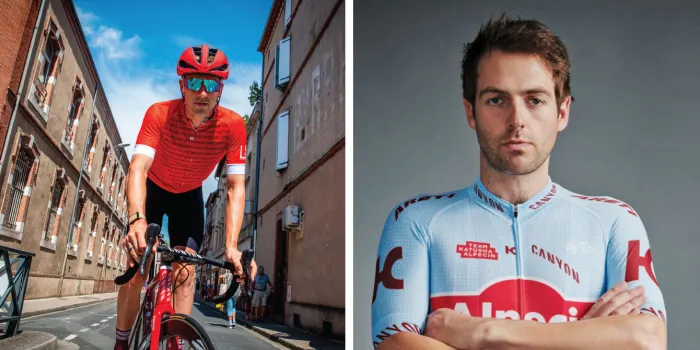On July 28, British professional cyclist Alex Dowsett accomplished something not many people probably thought was likely when he was diagnosed with severe hemophilia A at 18 months old. That evening in Paris, the 30-year-old Dowsett pedaled his bike into the iconic city’s streets, raced up and down the famed Champs-Élysées and then crossed the finish line of the 2019 Tour de France.
The next day, in a passionate Instagram post picturing him hugging his girlfriend at the finish, Dowsett wrote, “Tour de France finish line. There were times this past 3 weeks I doubted I might see it.” Indeed, his previous attempt at the race, in 2015, ended early because of an injury. This year, riding as one of eight members of his Swiss-based Team Katusha-Alpecin professional cycling team, Dowsett had made it all the way.
Years of hard work had gone into the achievement, but in the afterglow Dowsett informed his more than 67,000 Instagram followers he’d gotten there “because I’m lucky.” He was lucky, he said, to have good healthcare, access to the latest medication and knowledgeable healthcare providers, and lucky that his schools and racing teams “respected and wanted to know everything they needed to know about my condition but didn’t treat me any differently to the others.”
This good fortune, he noted, is not the norm everywhere. “Haemophilia is a geographical condition where the disparity of care between countries is huge,” he wrote. Dowsett then committed himself and the UK charity organization he founded, Little Bleeders, to “trying to make the world’s haemophilia community as lucky as I have been.”
Long before he was a Tour de France finisher—and six-time British national champion in the time trial as well as a gold medalist for England at the 2014 Commonwealth Games—Dowsett was a kid with hemophilia who experienced the ups and downs of life with a chronic bleeding disorder. As a young boy, his left elbow was prone to spontaneous bleeds and he often wore a sling to school. There were nosebleeds, emergency room visits and difficult infusions. The Dowsetts had no history of hemophilia, so Alex, his parents, Jan and Phil, and his younger sister, Lois, all learned on the fly.
Dowsett’s healthcare team encouraged him to be active, but he often had to sit out rough-and-tumble sports like rugby and soccer. At 11 or 12, he channeled his athletic energies into swimming competitively (around this time he also began prophylaxis).
A year or two later, Dowsett discovered cycling, getting his first taste on a mountain biking trip with family friends and then through road riding with an area cycling club. His aerobic fitness from swimming translated well to cycling. He began racing and found immediate success. At 14, he competed in the under-17 age group in a national time trial, finishing second in a field of 100 boys. He went on to win numerous races at the junior level and at 18 left home to race full time for the Great Britain Cycling Team Academy, a program designed to develop future Olympians. In 2011, at 22, he signed his first professional contract and has raced ever since at the highest level.
While Dowsett has had his share of injuries (he missed the London Olympics in 2012 and the Rio Games in 2016 because he was hurt), he says he’s always had good support from his teams’ medical staffs. Managing his hemophilia as an elite athlete has generally been smooth, Dowsett says. He knows his body well by now. He normally infuses every other day. During races, he infuses inside the team bus. For a long stage race like the Tour de France, his factor is stored in a cooler and transported in one of the team cars that follows the racers.
As living proof that being active while paying proper attention to your bleeding disorder can lead to great things, Dowsett wanted to spread that message to young people. He founded Little Bleeders to encourage kids to “Move More, Be More,” as the group’s motto says. Finding a safe sport or activity that kids love can not only promote health but also bring them joy and self-confidence, he says.
As for what’s next for Dowsett, 2020 is an Olympic year, and he’s looking to stay healthy and injury-free and hopefully line up for Great Britain at the Tokyo Games next summer.

